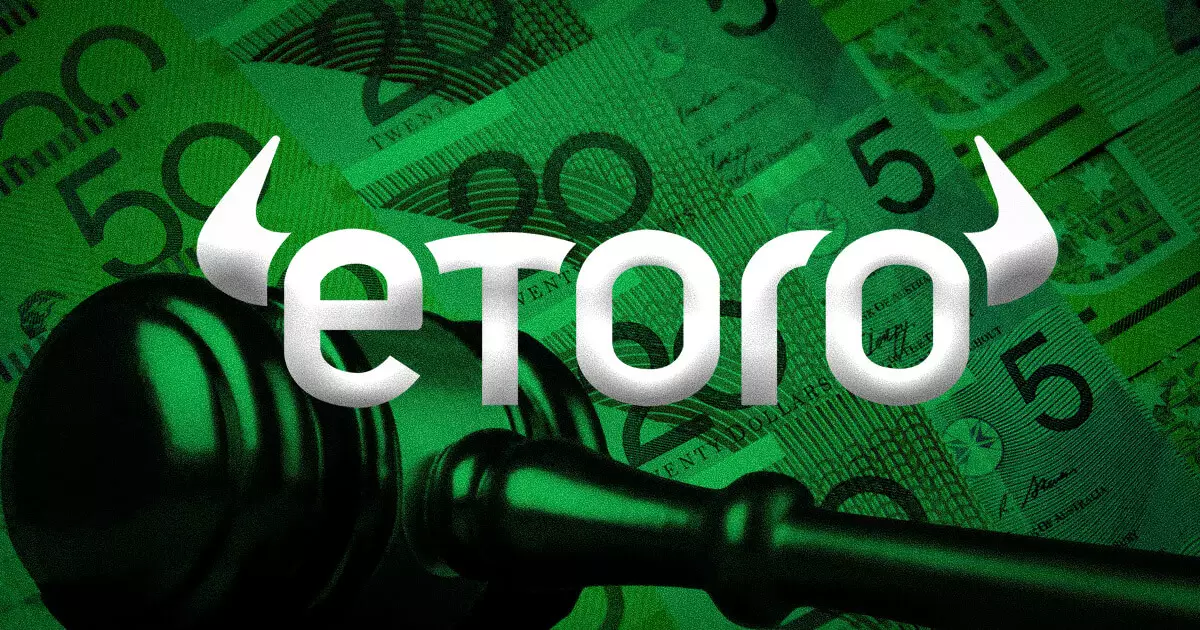The Australian Securities and Investments Commission (ASIC) has recently taken legal action against eToro, a popular online trading platform, claiming that it violated financial regulations related to cryptocurrency derivative products. According to ASIC, eToro allegedly contravened the design and distribution obligations under the Corporations Act 2001 between October 2021 and July 2023. This lawsuit comes as a disappointment to ASIC, given eToro’s significant market penetration and global brand awareness. The regulator emphasizes the importance of narrow target markets for Contract For Difference (CFD) products, as retail clients face the risk of losing all their deposited funds.
ASIC accuses eToro of defining its CFD target market too broadly, which raises concerns about the inclusion of retail clients with limited investment knowledge and experience. Even clients with a medium-risk tolerance but no understanding of the risks involved in CFD trading fell within eToro’s target market. The regulator argues that CFD issuers must comply with design and distribution obligations and cannot manipulate target markets to suit their existing client bases.
eToro, in response to the allegations, has stated that it is considering ASIC’s claims and will respond accordingly. The company assures its clients that the lawsuit will have no impact or disruption on its services and global business. eToro acknowledges the need for a revised target market determination for CFDs and confirms that it is operating with one in place. The allegations specifically pertain to the period from October 5, 2021, to July 29, 2023. Furthermore, eToro emphasizes its commitment to adhering to rules and regulations in all jurisdictions and asserts its collaboration with financial authorities to ensure consumer protection.
The crux of the lawsuit revolves around eToro’s purported inadequate target market determinations. ASIC argues that eToro’s screening tests for retail investors were difficult to fail, leading to the inclusion of unsuitable investors who were exposed to significant losses. CFDs, which allow investors to speculate on the price movements of various underlying assets, including cryptocurrencies, forex, commodities, and stocks, are complex financial instruments involving leverage. ASIC maintains that CFDs are generally unsuitable for most retail investors due to their complexity and the high level of risk associated with leverage.
ASIC has previously taken administrative actions against other entities involved in high-risk CFD trading, such as Saxo Capital Markets and Mitrade Global Pty Ltd. During the period under scrutiny, eToro had nearly 30,000 retail clients trading CFDs, with around 19,601 of them suffering realized losses totaling over AUD 26 million. The regulator points out that a significant number of eToro CFD clients had no financial knowledge or previous experience trading with leverage. ASIC claims that eToro failed to act efficiently, honestly, and fairly as a financial services licensee, contravening its obligations and resulting in harm to consumers.
ASIC’s design and distribution obligations (DDO) require firms to design financial products that meet consumers’ needs and distribute them in a targeted manner. A target market determination, a crucial requirement under the DDO, specifies the class of consumers for which a financial product is likely best suited. ASIC seeks penalties, compliance orders, and costs from eToro for its alleged breaches of these obligations. eToro has not publicly commented on the lawsuit, and the case will be heard in the Federal Court of Australia.
As regulatory scrutiny of cryptocurrency trading platforms increases, ASIC’s lawsuit against eToro highlights the importance of ensuring investor safeguards in the digital asset sector. The allegations against eToro mainly revolve around the broad definition of its CFD target market, including retail clients ill-suited for such high-risk trading. ASIC emphasizes the need for compliance with the design and distribution obligations to protect consumers and maintain the integrity of the financial system. The outcome of this lawsuit could have significant implications for eToro and serve as a precedential case for the broader industry.


Leave a Reply